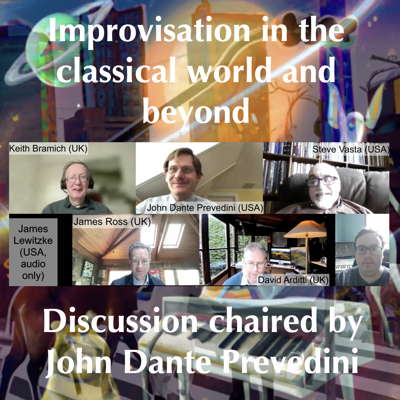 DISCUSSION: John Dante Prevedini leads a discussion about Improvisation in the classical world and beyond, including contributions from David Arditti, James Lewitzke, James Ross and Steve Vasta.
DISCUSSION: John Dante Prevedini leads a discussion about Improvisation in the classical world and beyond, including contributions from David Arditti, James Lewitzke, James Ross and Steve Vasta.
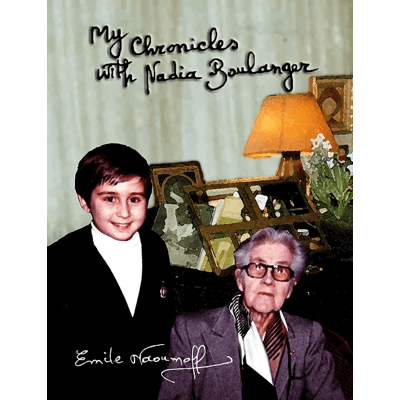 PODCAST: Join Jenna Orkin, Maria Nockin, John Daleiden, Gerald Fenech, Julian Jacobson, Patrick Maxwell, Giuseppe Pennisi and Mike Wheeler for a fascinating fifty-minute audio only programme.
PODCAST: Join Jenna Orkin, Maria Nockin, John Daleiden, Gerald Fenech, Julian Jacobson, Patrick Maxwell, Giuseppe Pennisi and Mike Wheeler for a fascinating fifty-minute audio only programme.
- Germans
- William Busch
- Paderewski
- Janáček
- England
- Bacewicz: Concerto for Large Symphony Orchestra
- Annabel Rooney
- Mariana Corichi Gomez
A RENAISSANCE MAN

GILLIAN WILLS talks to Jack Liebeck, artistic director of the Australian Festival of Chamber Music
Jack Liebeck, artistic director of the hugely successful nine-day Australian Festival of Chamber Music, spoke to me about striking a balance between the Festival's well-established traditions and the introduction of new elements, how acoustic spaces designed specifically for performance of live classical music are crucial and his surprising wish list for the future.
Hot property as a soloist with the world's best orchestras, a recitalist and chamber musician, Liebeck describes himself as a Renaissance man. Apparently, he's a keen photographer, a physics enthusiast and science nerd. He once launched a series of concerts to commemorate Einstein's Theory of Relativity.
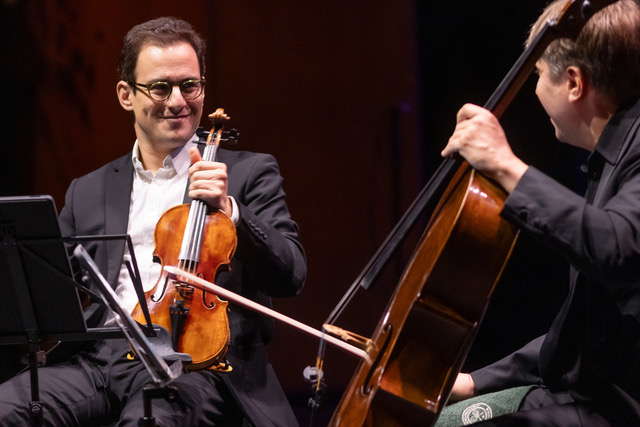
Jack Liebeck (left)
Oxford May Music in Oxfordshire (UK) is an unusual happening which Liebeck founded and now leads. It's different because of the diverse cultural programs curated by Liebeck and physicist Professor Brian Foster. Clearly a connoisseur of festivals, the violinist also heads up Alpine Classics in Grindelwald.
Liebeck regularly performed at tropical North Queensland's AFCM before taking on the directorship in 2022. His grass roots experience as a player makes him committed to the occasion's established traditions fine-tuned in the course of its thirty-four-year history. These include the Queens Gardens, St James Cathedral, Ray Golding Sunset Series and Evening concerts as well as the annual whale-watching boat trip which more often than not rides flamboyant waves to an offshore island where ticket holders are treated to an alfresco recital. This year the destination is Orpheus-Goolboddi.
Needless to say the violinist's creative DNA is imprinted all over this year's offerings. His additions include ‘Guilty Pleasures' where artists perform a piece they love regardless of the genre even if it's a blues or rock song.
Liebeck has a knack for putting a conceptual spin on a concert which grounds the musical content, not always easy listening, in an appealing format. It gives him great joy when an audience loves his carefully chosen repertoire.
This year there are six world premieres and one Australian, a stellar line-up of players from all over the world including the distinguished British clarinetist Michael Collins. There's a spotlight on women superstars too which includes UK soprano Carolyn Sampson who will be making her Australian debut and Emily Sun, the astonishing London-based Australian violinist. For the first time, young musicians will join forces with experienced musicians live on stage.
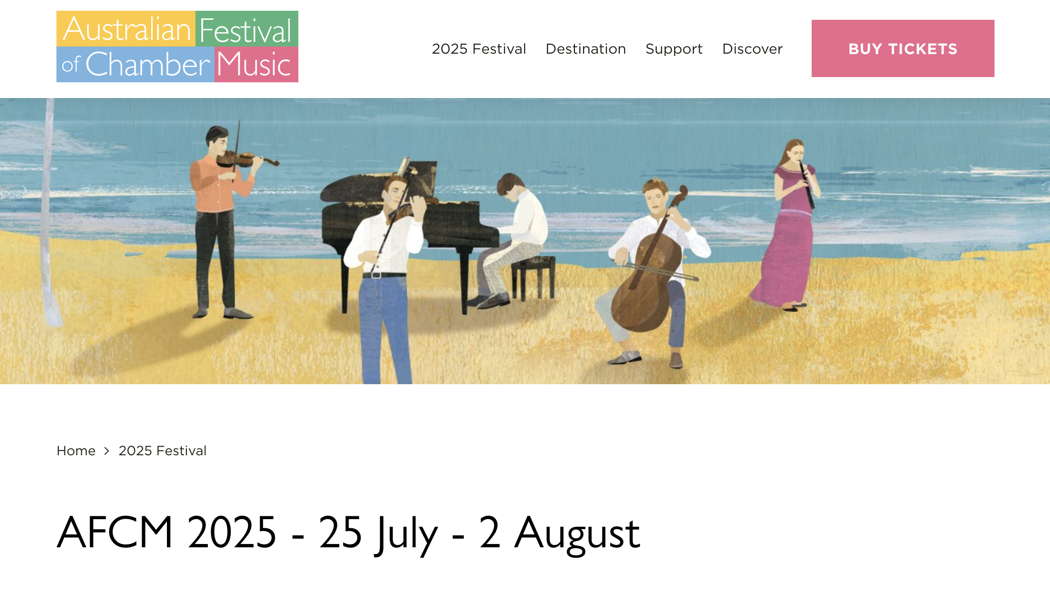
Online publicity for the 2025 Australian Festival of Chamber Music
Feuding composers get a look in too. Who knew Tchaikovsky and Brahms couldn't stand each other? A Long Table Lunch will be serenaded by the Andromeda Sax Quartet and then there are bouts of musical mind food brokered by ABC broadcaster and composer Andrew Ford. His Who's Afraid of Big Bad Serialism seeks to make Schoenberg, Webern and Berg's works relatable.
Concert Conversations in which Liebeck interviews the Festival artists about their careers and their experiences on stage and approach to performance is a drawcard. For Liebeck playing the violin is storytelling, taking people on a journey:
A musical work has a personality and I have to bring that person to life. I tell my students that it's their job to enable their listeners to find meaning through the sounds they make. Whether the music is happy, sad, or is about flying through the air or drowning you are describing this through your playing.
On the subject of whether festivals help to maintain a healthy focus on music-making in a climate in which music performance courses are being dropped from Australian universities Liebeck says:
Yes. Which is why I'm immensely grateful to The Ian Potter Foundation which has donated $525,000 for the purposes of boosting the AFCM's educational and mentoring Pathways Program.
Talking about the importance of a venue with a bespoke acoustic for live performance Liebeck is firm.
It's pivotal to have excellent acoustics to promote optimal tone production. A concert hall with a gifted acoustic becomes an extension of the instrument enabling the violin to fully vibrate. Sadly, a stage like Townsville's Civic Theatre gives you absolutely no help in this regard because it was designed for amplification and not live classical performance. I should say that we enhance the sound with mild amplification for the audience's benefit.
But it's also true I've had some of the most eventful performances on the Townsville Civic Centre's stage. In one of my first years at the festival another international violinist had to pull out. I added most of his repertoire to my own long list of pieces to be performed. One of these was Chausson's Poeme, arranged for violin, piano and string quartet which I performed with Piers Lane and the Goldner Quartet. It was broadcast live on ABC radio. It was electric.
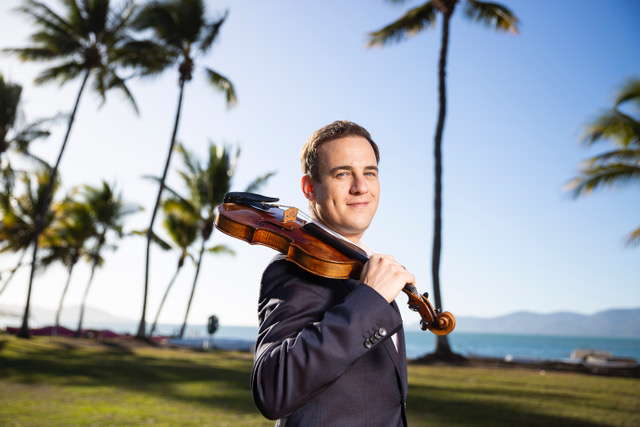
Jack Liebeck in Townsville-Gurambilbarra, North Queensland, Australia
If the festival was gifted with supplementary funding Liebeck is clear about what he would pick to add to his already ambitious program.
I'd like Brian Cox to give a talk about the links between music and science. We've done many collaborations together and he's a virtuoso as a speaker. That's why the AFCM board has implemented an Artistic Circle to generate sponsorships for worthy projects. I'd love to bring VOCES8, the outstanding British vocal ensemble and also comedy into the mix. We're already doing jazz with local bands on the Festival Garden stage.
Copyright © 27 March 2025
Gillian Wills,
Brisbane, Australia



